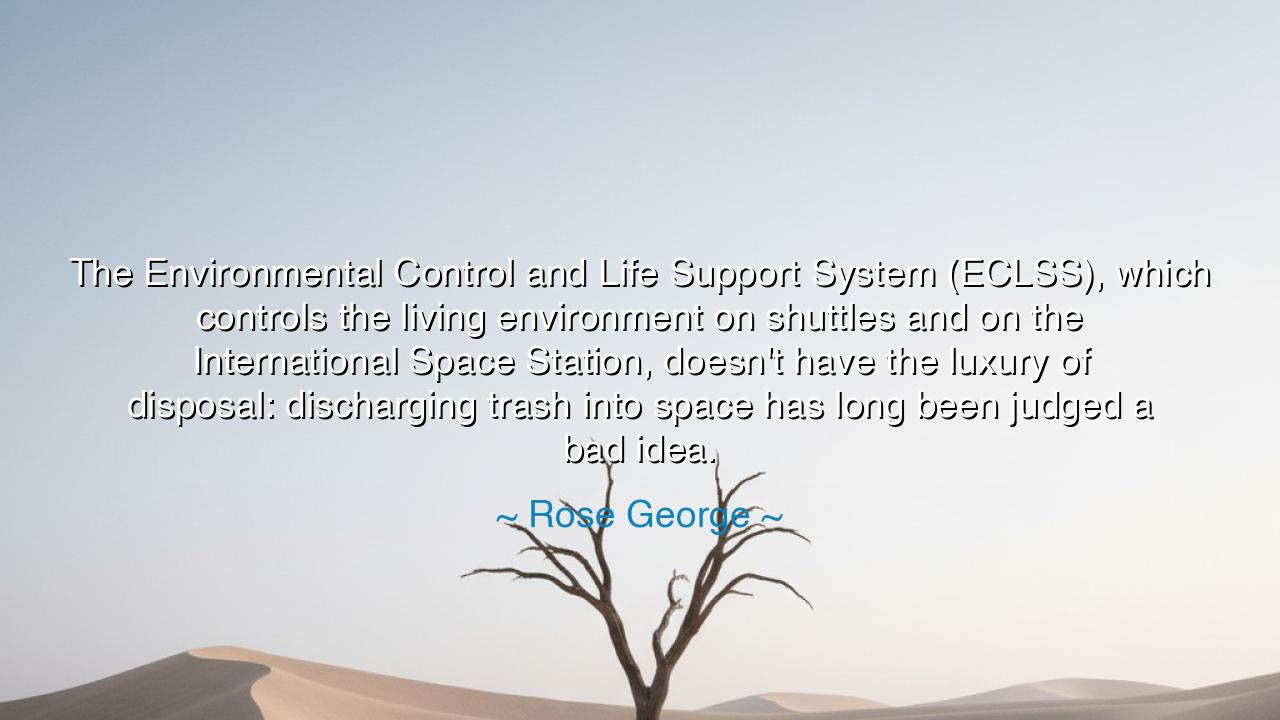
The Environmental Control and Life Support System (ECLSS), which
The Environmental Control and Life Support System (ECLSS), which controls the living environment on shuttles and on the International Space Station, doesn't have the luxury of disposal: discharging trash into space has long been judged a bad idea.






Hear the words of Rose George, who, with clarity born of observing the hidden labors of survival, declared: “The Environmental Control and Life Support System (ECLSS), which controls the living environment on shuttles and on the International Space Station, doesn’t have the luxury of disposal: discharging trash into space has long been judged a bad idea.” In this truth lies a profound lesson not only for astronauts but for all of humankind: in a closed system, there is no “away.” Every act of consumption leaves a remnant, and every remnant must be faced, transformed, or carried.
The ECLSS is the silent guardian of life in the void. It purifies air, recycles water, regulates temperature, and preserves the fragile balance that allows flesh and bone to endure beyond the cradle of earth. But unlike on earth, where men for centuries have cast their waste into rivers, oceans, and skies, the astronaut has no such illusion. There is no disposal in space. The shuttle, the station, the capsule—these are closed worlds. Every drop of water, every breath of oxygen, every speck of refuse must be managed, recycled, or contained. To hurl trash into the cosmos would be folly, scattering deadly debris that might one day return as a blade against the very vessel that cast it.
So too, is this not the same truth of our own planet? The earth itself is but a larger life support system, a closed sphere hurtling through the void. We imagine that when we bury our waste, or cast it into the sea, it vanishes. But nothing vanishes. Plastic returns in the fish we eat, smoke lingers in the air we breathe, poisons seep into the soil that grows our bread. The lesson of the ECLSS is the lesson of the earth: there is no “away.” The waste we ignore becomes the burden we inherit.
History offers its warnings. In ancient Babylon, the irrigation canals grew clogged with salt from careless management. The land that once fed empires turned barren, for the people thought the water carried their waste away, when in truth it carried it back to them. In our own time, the Great Pacific Garbage Patch swirls in the ocean, a floating monument to humanity’s illusion of disposal. Like the astronauts who dare not throw refuse into the void, we too must awaken to the reality that our planet is a vessel with no escape.
And yet, there is hope. The technology of space teaches us what necessity can accomplish. Astronauts drink water recycled from sweat and breath. They breathe oxygen reborn from carbon dioxide. They live by recycling, not by endless extraction. What they practice by survival, we must practice by wisdom: transform what we waste, renew what we use, and treat every resource as sacred. The future will not be built on what we throw away, but on what we learn to preserve.
The words of Rose George remind us that the void of space is merciless, yet it also teaches discipline. The same discipline must be learned here on earth, before we choke our own life support system with excess and carelessness. Our planet may seem vast, but like the shuttle and the station, it is enclosed, finite, and fragile. To act otherwise is to court destruction.
Therefore, O listener, let this teaching take root in your life. Reduce what you consume. Reuse what you can. Recycle what remains. Honor the cycle of nature that transforms death into life, waste into growth, ashes into renewal. Demand of leaders and industries the wisdom that astronauts already know: that to waste without thought is to endanger all.
So let the words of Rose George be remembered: disposal is illusion; responsibility is truth. As it is in the heavens, so it is on the earth. Guard your vessel, for it is the only one you will ever have.






AAdministratorAdministrator
Welcome, honored guests. Please leave a comment, we will respond soon